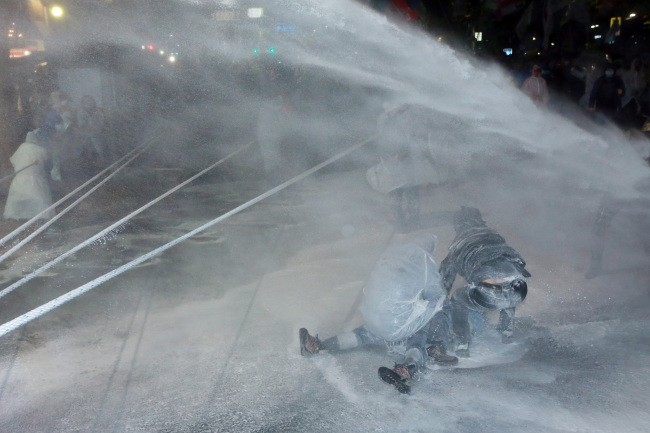When the dust settled after the Nov. 14 antigovernment mass rally, 51 were detained and scores more were injured from both sides, police and protestors alike. Reacting to the demonstration, President Park Geun-hye on Tuesday called for a ban on wearing face masks during protests, likening the masked protestors to IS terrorists.
But Park’s tough rhetoric ― which came as police mulled banning a second mass antigovernment rally on Dec. 5 ― appears to have backfired, with civic groups and the opposition accusing the leader of “waging war on her people.”
Park Ju-min, a member of the Lawyers for a Democratic Society also known as Minbyun, said in a radio interview that her comments were “inappropriate as a leader of a democratic nation.”
“These people took to the streets to exercise their fundamental rights, and it is not appropriate to compare them to terrorists. … I felt that (Park administration) is moving toward the direction of repressing the people’s rights to express their will,” he said.
 |
| Two protesters look after a farmer lying on the ground after he was sprayed by a water cannon during the Nov. 14 antigovernment mass rally in Jongno, Seoul, in this file photo. (Yonhap) |
The main opposition New Politics Alliance for Democracy accused Park of “using politics to induce division and confrontation (of people)” while the minor opposition Justice Party said Park is regarding her own people as “an object of repression.”
Choi Seung-gun, a 20-year-old student who participated in the rally, said that Park’s comments likening them to the IS was just “ridiculous.”
“Because of all the tear gas, many of us has to wear the masks. Yes, the IS hides their faces. Well they eat, too, so does that mean we can’t eat? That just shows you our president’s class,” he said.
Last week, Choi garnered media attention after claims that he was shot by water cannons while being carried off by medical staff.
The “attack” on Choi, coupled with an incident where a 69-year-old farmer Baek Nam-gi was knocked down by a water cannon blast ― mixed with tear gas ― and remains unconscious as of Wednesday, touched off a blame game over the legitimacy of the police force used during the rally.
While the local human rights watchdog labeled it “an attack against civilians” police said that it was an “unfortunate accident” that occurred during necessary use of water cannon to disperse violent protestors.
According to the National Police Agency, the protests caused 389 million won ($340,320) worth of damage to the police equipment, while 113 officers were injured by protesters. It accused 594 protestors of using excessive violence in the demonstration.
But protestors, along with eyewitnesses, blame the police for crossing the line while containing the protests.
Goh Eun-san, a medical student at the Yonsei University Wonju Campus, said the attack on Choi was particularly uncalled for, as he was attacked while being carried off to a hospital. He said in an online posting Friday that the ethics and pride of practicing medicine was “trampled” when an injured man was attacked.
Citing a medical law prohibiting any form of attack against an emergency patient, he urged action against what he called “an act against humanity.”
“Right now we are gathering signatures to convene an emergency meeting of the Association of Medical Students. We may hold the meeting next week,” he said. The association is expected to discuss Choi’s incident at the meeting, and urge the government to punish those involved and make sure that such incidents do not reoccur.
Kang Sin-myeong, the chief of NPA, denied that the water cannons were aiming for the patient. But Choi said Kang’s explanations were unlikely as the supposed spraying went on for at least a minute.
The civic demonstration on Nov. 14, the largest since 2008, was organized by civic groups across the country to protest the government’s recent decision to reform the labor sector, open the agricultural market and reinstate the government-issued state textbooks for secondary education.
Controversy over violent rallies is expected to persist as the opposing parties are at loggerheads over Park’s emphasis on banning masked protests.
Rep. Jeong Kab-yoon of the ruling Saenuri Party proposed a bill which bans participants from wearing masks during violent protests. Non-violent protests or demonstrations where participant have a legitimate reason to wear masks ― such as illness ― are allowed. Violation can result in a maximum two years behind bars or 3 million won in fine.
The bill also stepped up the regulation on weapons. The previous law only punished those who used them but an amendment will discipline anyone who makes, transports and stores weapons. It also restricts protests when colleges hold the admission process, such as interviews or essays.
“Although freedom of assembly is a constitutional right, the violent and illegal protests are disturbing the social order each year. The purpose of the bill is to establish a culture of law-abiding demonstration by putting our foot down on violent protests,” he said.
Rep. Kim Young-nam of the same party pointed out that even many European countries which have advanced laws to protect human rights regulate wearing masks during demonstrations.
But Park of Minbyun said that violence at Korean protests are different from those in countries where masks are prohibited.
“In those countries, protestors are reported to have committed robbery or arson. There haven’t been any reports of such cases in Korea. The physical altercation (for Korea) usually occurs between protesters and police attempting to disperse them,” he said.
Rep. Kim Kwang-jin of the NPAD said that the Constitutional Court in 2003 has already ruled that choosing one’s own attire is part of the freedom of assembly.
By Yoon Min-sik
(minsikyoon@heraldcorp.com)

